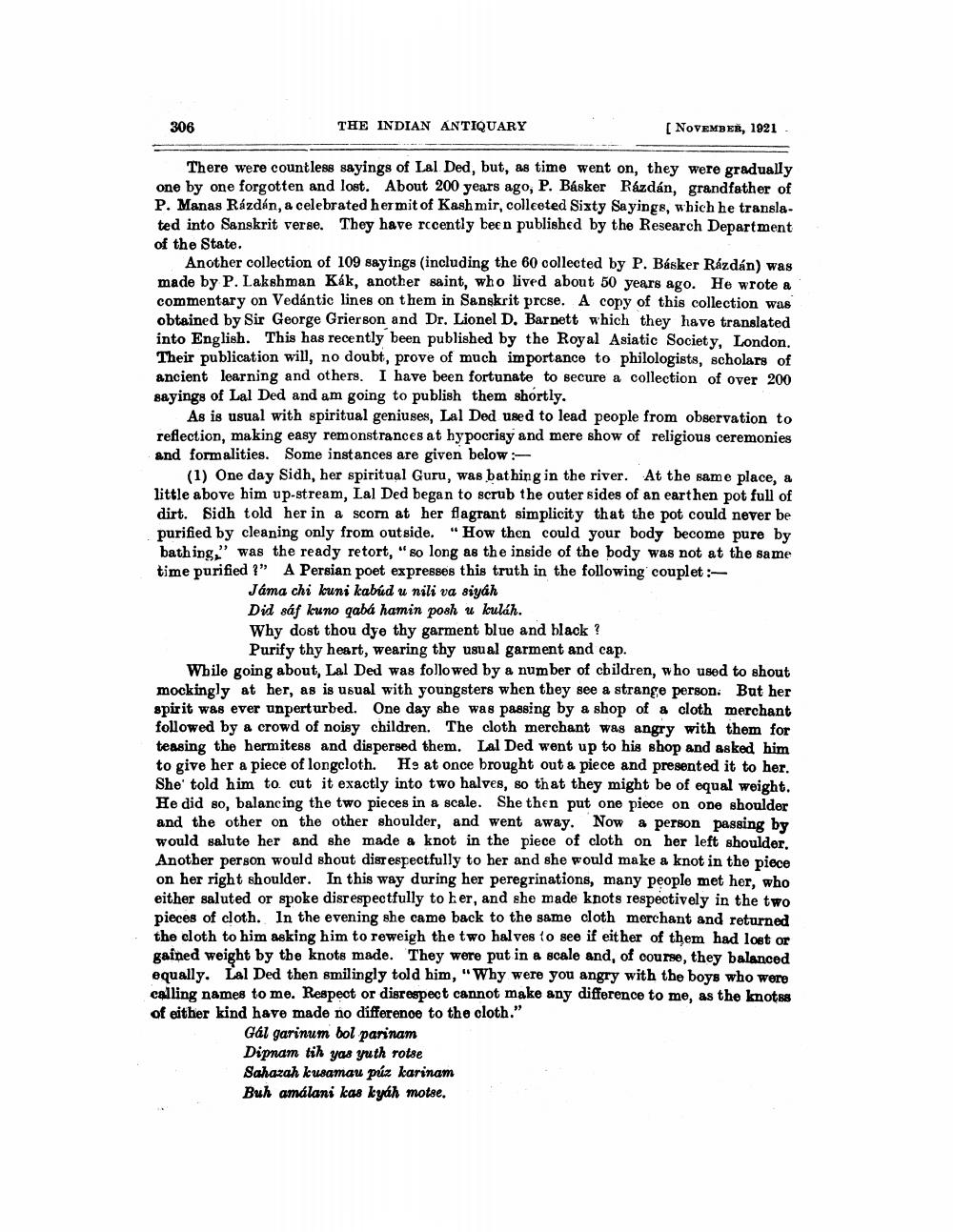________________
306
THE INDIAN ANTIQUARY
[NOVEMBER, 1921
There were countless sayings of Lal Ded, but, as time went on, they were gradually one by one forgotten and lost. About 200 years ago, P. Básker Rázdán, grandfather of P. Manas Rázdán, a celebrated hermit of Kashmir, colleeted Sixty Sayings, which he translated into Sanskrit verse. They have recently been published by the Research Department of the State.
Another collection of 109 sayings (including the 60 collected by P. Básker Rázdán) was made by P. Lakshman Kák, another saint, who lived about 50 years ago. He wrote a commentary on Vedantic lines on them in Sanskrit prcse. A copy of this collection was obtained by Sir George Grierson and Dr. Lionel D. Barnett which they have translated into English. This has recently been published by the Royal Asiatic Society, London. Their publication will, no doubt, prove of much importance to philologists, scholars of ancient learning and others. I have been fortunate to secure a collection of over 200 sayings of Lal Ded and am going to publish them shortly.
As is usual with spiritual geniuses, Lal Ded used to lead people from observation to reflection, making easy remonstrances at hypocrisy and mere show of religious ceremonies and formalities. Some instances are given below:
(1) One day Sidh, her spiritual Guru, was bathing in the river. At the same place, a little above him up-stream, Lal Ded began to scrub the outer sides of an earthen pot full of dirt. Sidh told her in a scorn at her flagrant simplicity that the pot could never be purified by cleaning only from outside. "How then could your body become pure by bathing," was the ready retort, "so long as the inside of the body was not at the same time purified?" A Persian poet expresses this truth in the following couplet :
Jáma chi kuni kabúd u nili va siyáh
Did saf kuno qabá hamin posh u kuláh.
Why dost thou dye thy garment blue and black?
Purify thy heart, wearing thy usual garment and cap.
While going about, Lal Ded was followed by a number of children, who used to shout mockingly at her, as is usual with youngsters when they see a strange person. But her spirit was ever unperturbed. One day she was passing by a shop of a cloth merchant followed by a crowd of noisy children. The cloth merchant was angry with them for teasing the hermitess and dispersed them. Lal Ded went up to his shop and asked him to give her a piece of longcloth. He at once brought out a piece and presented it to her. She told him to cut it exactly into two halves, so that they might be of equal weight. He did so, balancing the two pieces in a scale. She then put one piece on one shoulder and the other on the other shoulder, and went away. Now a person passing by would salute her and she made a knot in the piece of cloth on her left shoulder. Another person would shout disrespectfully to her and she would make a knot in the piece on her right shoulder. In this way during her peregrinations, many people met her, who either saluted or spoke disrespectfully to her, and she made knots respectively in the two pieces of cloth. In the evening she came back to the same cloth merchant and returned the cloth to him asking him to reweigh the two halves to see if either of them had lost or gained weight by the knots made. They were put in a scale and, of course, they balanced equally. Lal Ded then smilingly told him, "Why were you angry with the boys who were calling names to me. Respect or disrespect cannot make any difference to me, as the knotss of either kind have made no difference to the cloth."
Gál garinum bol parinam Dipnam tih yas yuth rotse Sahazah kusamau púz karinam Buh amálani kas kyáh motse.




